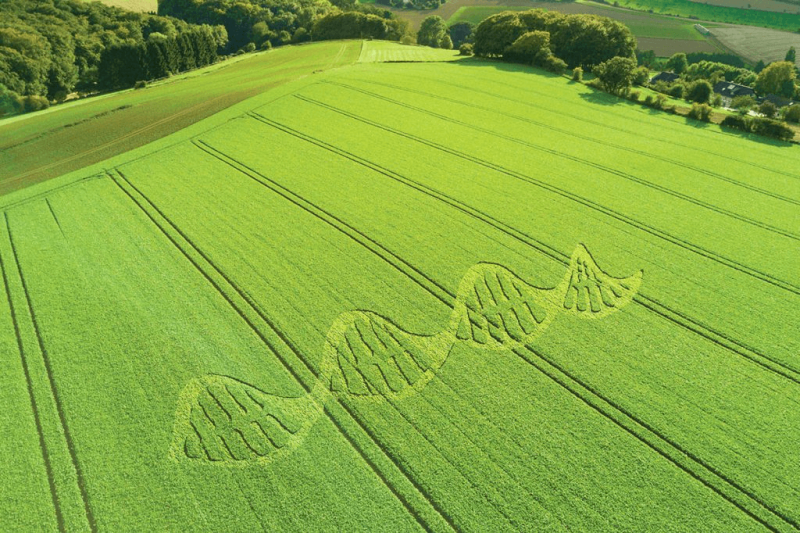Challenging the anti-GMO ‘foreign gene’ Frankenfood myth: Crops ‘steal’ genes from other species to accelerate evolution
Challenging the anti-GMO ‘foreign gene’ Frankenfood myth: Crops ‘steal’ genes from other species to accelerate evolution


The stolen genetic secrets give them an evolutionary advantage by allowing them to grow faster, bigger or stronger and adapt to new environments quicker. These findings could inform future work to create crops that are more resistant to the effects of climate change and help to tackle food security problems.
The Sheffield team studied grasses, which include some of the most economically and ecologically important plants, such as the most globally cultivated crops wheat, maize, rice and barley.
Grasses are taking an evolutionary shortcut by borrowing genes from their neighbours. By using genetic detective work to trace the origin of each gene, we found over 100 examples where the gene had a significantly different history to the species it was found in.
The findings may make us as a society reconsider how we view GM technology, as grasses have naturally exploited a very similar process. If we can determine how this process is happening it may allow us to naturally modify crops and make them more resistant to climate change.
What we are seeing is not hybridisation, but the consequences are similar. Lateral gene transfer can move genetic information across wider evolutionary distances, which means it can potentially have even bigger impacts.
Whilst only a relatively small proportion of genes are transferred between species, this process potentially allows grasses to cherry pick information from other species. This likely gives them huge advantages and may allow them to adapt to their surrounding environment quicker.
—Dr Luke Dunning senior author of the research from the University of Sheffield’s Department of Animal and Plant Sciences
Samuel Hibdige, first author of the research and PhD Researcher from the University of Sheffield, said:
We still don’t know how this is happening or what the full implications are. But, we know it is widespread in grasses, a family of plants that provide a majority of the food we eat.
We detected foreign DNA in a wide range of grasses with all kinds of life history strategies indicating it is not restricted to those with a specific trait. However, we did detect a statistical increase in species which possess certain kinds of modified stems called rhizomes.
Since Darwin, much of our understanding of evolution has been based on the assumption that common descent is the rule for plant and animal evolution, with genetic information passed from parents to offspring.
The team’s next steps will be to determine the biological mechanism behind this phenomenon and to investigate whether this is an ongoing process in crops that contributes to the differences we observe between crop varieties.
Read the original post here

 | Videos | More... |

Video: Nuclear energy will destroy us? Global warming is an existential threat? Chemicals are massacring bees? Donate to the Green Industrial Complex!
 | Bees & Pollinators | More... |

GLP podcast: Science journalism is a mess. Here’s how to fix it

Mosquito massacre: Can we safely tackle malaria with a CRISPR gene drive?

Are we facing an ‘Insect Apocalypse’ caused by ‘intensive, industrial’ farming and agricultural chemicals? The media say yes; Science says ‘no’
 | Infographics | More... |

Infographic: Global regulatory and health research agencies on whether glyphosate causes cancer
 | GMO FAQs | More... |

Why is there controversy over GMO foods but not GMO drugs?

How are GMOs labeled around the world?

How does genetic engineering differ from conventional breeding?
 | GLP Profiles | More... |

Alex Jones: Right-wing conspiracy theorist stokes fear of GMOs, pesticides to sell ‘health supplements’




 Viewpoint — Fact checking MAHA mythmakers: How wellness influencers and RFK, Jr. undermine American science and health
Viewpoint — Fact checking MAHA mythmakers: How wellness influencers and RFK, Jr. undermine American science and health Viewpoint: Video — Big Solar is gobbling up productive agricultural land and hurting farmers yet providing little energy or sustainabilty gains
Viewpoint: Video — Big Solar is gobbling up productive agricultural land and hurting farmers yet providing little energy or sustainabilty gains Fighting deforestation with CO2: Biotechnology breakthrough creates sustainable palm oil alternative for cosmetics
Fighting deforestation with CO2: Biotechnology breakthrough creates sustainable palm oil alternative for cosmetics Trust issues: What happens when therapists use ChatGPT?
Trust issues: What happens when therapists use ChatGPT? 30-year-old tomato line shows genetic resistance to devastating virus
30-year-old tomato line shows genetic resistance to devastating virus California, Washington, Oregon forge immunization alliance to safeguard vaccine access against federal undermining
California, Washington, Oregon forge immunization alliance to safeguard vaccine access against federal undermining The free-range chicken dilemma: Better for birds, but with substantial costs
The free-range chicken dilemma: Better for birds, but with substantial costs ‘You have to treat the brain first’: Rethinking chronic pain with Sanjay Gupta
‘You have to treat the brain first’: Rethinking chronic pain with Sanjay Gupta
